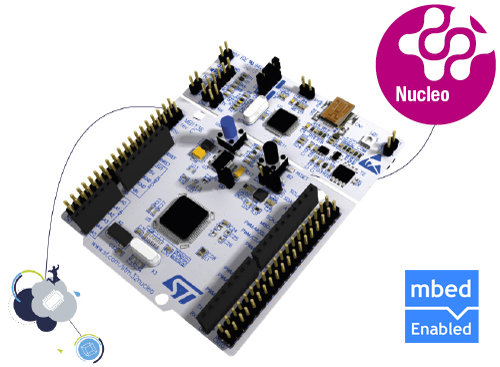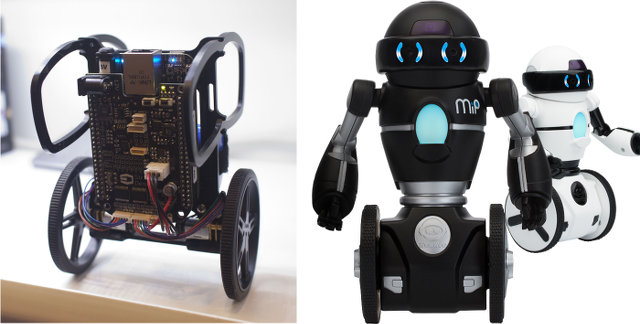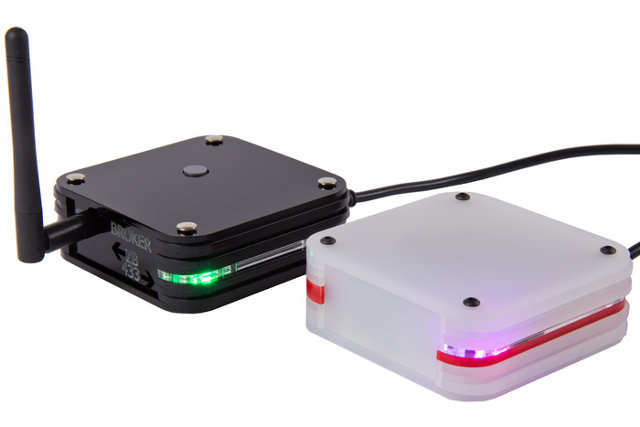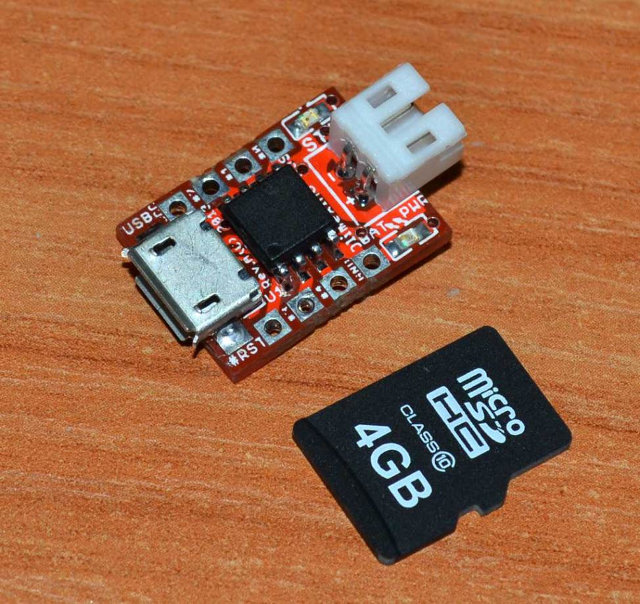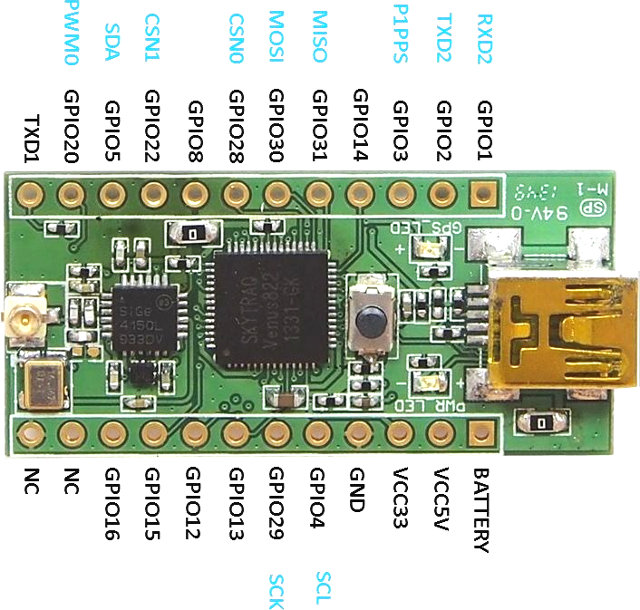You would like to start to grow your own vegetables but you don’t really have enough place and/or time to take care of your garden. No problem! Just go vertical and automate your garden with an Arduino Mega, an Ethernet shield, and lots sensors and valves. That’s basically what Rik Kretzinger, who grew up on a Christmas tree farm, and has a major in horticulture, has done at his home. This whole system use a farming technique called aquaponics, mixing aquaculture (raising fish in tanks) and hydroponics (cultivating plants in water), and except planting and harvest, is mostly automatized. The hard part is to set it up. The firmware is based on APduino “Internet-of-growing” open source project that runs on Arduino Mega to gather data from sensors (humidity, temperature, pH, light…) and control the valve. Rik’s system also upload data automatically to Xively cloud so that he can monitor his […]
STMicro Unveils $10 mbed-enabled and Arduino Compatible Nucleo Development Boards
STMicro already announced a $24 NFC development kit a few days ago, and they’ve now announced new ultra low cost STM32 development boards. STMicro Nucleo development boards are based on different STM32 MCU based on ARM Cortex M0, M3 and M4, feature Arduino headers, and are supported by mbed platform. There are currently four boards available: NUCLEO-F401RE – Based on STM32F401RET6 ARM Cortex M4 MCU @ 84 MHz with 512KB flash memory, 96 KB SRAM NUCLEO-F030R8 – Based on STM32F030R8T6 ARM Cortex M0 MCU @ 48 MHz with 64KB flash memory, 8KB SRAM NUCLEO-F103RB – Based on STM32F103RBT6 ARM Cortex M3 MCU @ with 128KB flash memory, 20 KB SRAM NUCLEO-L152RE – Based on STM32L152RET6 ARM Cortex M3 MCU @ 32MHz with 512KB flash memory, 32KB SRAM All four boards share the following specifications: STM32 microcontroller with LQFP64 package Two types of extension resources Arduino Uno Revision 3 connectivity STMicroelectronics […]
Webee Boss is Both an Android TV Box and an Home Automation Gateway (Crowdfunding)
Lots of Android TV Boxes and HDMI dongles have hit the market last year, and low cost home automation systems have been launched, or are in development, such as Ninja Sphere. Webee Boss combines both to make your TV and your Home smart, as part of the Webee home automation platform, also composed of “Bees” (Smart Plug, Smart Lamp Holder, Smart Host, Presence Tag, Open/Closed sensors, etc…), Hive m3 development board, and an Android app. Webee Boss specifications: SoC – ARM Cortex A9 Microprocessor @ 800MHz System Memory – 1 GB RAM Storage – 2 GB NAND Flash, micro SD card slot up to 32GB Connectivity 10/100M Ethernet 802.11 b/g/n WiFi IEEE 802.15.4 – ZigBee. Mesh networking. Home Automation profile. Z-Wave. Mesh networking. Home Automation standards compatible in most countries. Wireless Range – Outdoor: 45 to 90 meters, Indoor 45 – 60 meters Video Output – HDMI 1.3 (up to […]
The Open Source Robots Invasion Has Begun: BeagleMiP, uARM, and PiddyBot
In the last few days, I’ve come across three affordable open source robots either based on BeagleBone Black, or Arduino compatible boards, and I’m sure there are many other projects out there for people interested in getting started with robotics without breaking the bank. BeagleMiP Self-balancing Robot I’ve found out the first robots from a long armdevices.net video showing two Mobile Inverted Pendulum (MiP) robots, able to stand on two wheels, designed by the Coordinated Robotics Lab of The University of California, San Diego: BeagleMiP educational robotics development kit from Strawson Design. The kit features the BeagleBone Black board with Texas Instruments Sitara ARM Cortex A8 processor and Novus Robotics Cape, an add-on board that provides 9-axis IMU (Accelerometer, Gyro, Magnetometer), 6 PWM connectors to power servos or brushless ESCs, 2 user-accessible buttons and 2 LEDs, a cell balancer & overvoltage protector, H-bridges to drive 6 DC Motors, and connectors […]
Crowdfunding Report 2013 on CNXSoft Blog
Crowdfunding has really took off in 2013, with sites like Kickstarter and Indiegogo, as they enable start-ups to launch new and innovative products, and some established, even large companies, I’m thinking Canonical with Ubuntu Edge here, have also tapped into that market, actually shifting part of the risks from shareholders, to customers / individual funders. In this post, I’ll go through all the crowdfunding projects, 16 Indiegogo and 25 Kickstarter campaigns, featured on cnx-software.com between the beginning of December 2012 till the end of November 2013, to find out which ones have been a stellar success in terms of funding and on-time delivery, and those that have failed in one way or another, with some being close to looking like scams. There was a wide range of products with dealing home automation, the Internet of things, wireless Arduino compatible boards, Linux development boards, media players and more. Let’s go straight […]
SliceCase is a Modular & Customizable Case for Arduino, Raspberry Pi, and Soon More (Crowdfunding)
When you design hardware around Arduino or Raspberry Pi boards, most likely that not, the enclosures available on the market won’t be usable with your project, and you’ll have to design your own which may end up not quite looking as nice as you expected. Two Hornets, a startup based in the Netherlands, is trying to provide a solution with SliceCase, a modular and customizable casing system, that at first looks similar to some other enclosures like Pimoroni PiBow case. But there’s more than meets the eye, as SliceCase is composed of standard components, that allow you to build the casing around your hardware, and even order custom top covers and sides online. At first, they’ll focus on the most popular boards such as Arduino Standard and Mega boards, and the Raspberry Pi, but if this concept takes off more boards will be added. The enclosure system is composed of […]
OLIMEXINO-85S Arduino Compatible Board is About the Size of a micro SD Card
Several Arduino boards have been designed to be as small as possible this year, including Microduino (25.40 x 27.94mm) and OLIMEXINO-NANO (30 x 30 mm). But Olimex has gone a step further, or should I say smaller, with OLIMEXINO-85S that just a little bit bigger than a micro SD card at 16.9 x 12.7 mm, and may currently claim the title of the smallest Arduino compatible board ever. A board that tiny comes with pretty short specifications: MCU – Atmel ATTiny85 @ 20MHz with 8 KB Flash, and 512B RAM. Misc – two LEDs one for power supply and one user programmable I/O – All 6 I/O pins (I2C, SPI, up to 4 ADC), as well as power pins, available via through holes Power – Via USB micro connector or by LiPo battery The board will be programmable by the Arduino IDE made by Digispark. OLIMEXINO-85S will be available at […]
$15 and Up NavSpark is a tiny GPS / GNSS Arduino Software Compatible Board (Crowdfunding)
[Update: I’ve been told the project is actually launched by SkyTraq. But later, after Indiegogo perks are shipped, they expect to have our customer NAVIN handle later orders and manufacturing, the non-engineering development side of things. Updated post accordingly] Navin, a Taiwanese start-up specialized in location products, SkyTraq, a fabless semiconductor company, which develops GPS chipset for consumer navigation and tracking applications, has recently launched an Indiegogo campaign for NavSpark, their low cost GPS / GNSS board with a 32-bit LEON3 SPARC V8 MCU that can be programmed with the Arduino IDE. Two other models are available: NavSpark-BD for GPS/Beidou, and NavSpark-GL for GPS/GLONASS. NavSpark NavSpark specifications: GSP Receiver – SkyTraq Venus 822 LEON3 Sparc-V8 MCU @ 100MHz with IEEE-754 Compliant FPU, 1024KB Flash Memory, 212KB RAM. GPS – quad-GNSS engine capable of handling 34 GPS / GLONASS/ Beidou / Galileo signals in parallel I/Os – 1x full duplex asynchronous […]



